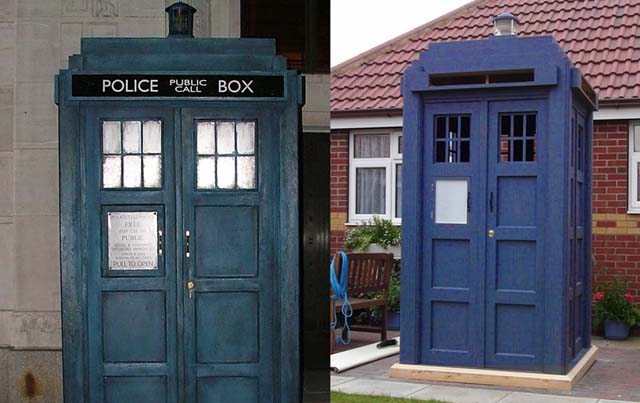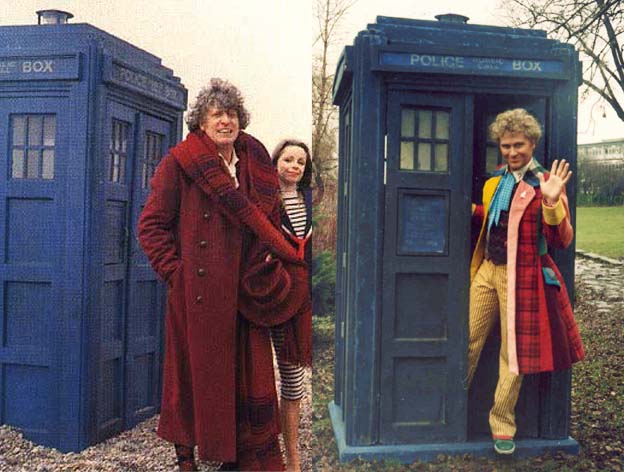Okay, I can see why Davies thought of swapping the first two episodes. That was a kind of weak beginning. Not bad; just… it was a bit of a mess. It reminded me of The Long Game, kind of. And The Two Doctors — the later bits, especially. Not really sure why, aside from Chip.
My favorite bit was the pre-title sequence, especially the bit with Rose saying goodbye as the Doctor warms up the TARDIS again after — apparently — four months. In the commentary they talk about how the Doctor was probably living with the Tylers the whole time since Christmas. Curious.
After that, pretty much every major plot element and/or device lost me completely. The one body-swap is reasonable enough. What’s the impetus for all the other swaps, though? Why was Cassandra turned to a bit of fairy dust who can flit around at will? Besides it making the writing easier, that is? It doesn’t mesh with the elaborate procedure behind the first transfer.
Then the zombie patients. Okay, they can spread every disease known to man just by touching you. Fair enough. And yet if they’ve got thousands of diseases apiece, why are they cured by a handful of random serums yanked off the shelf? Just by being splashed with them? And why can they pass the cure on to other zombies (again) just by touching them?
And that’s just the immediate plot. Don’t get me started on structure.
This is the first time I’ve really been frustrated by a RTD script. I’m just… perplexed by this whole thing. There are so many nice little scenes in this episode, few of which are given space, most of which are basically throwaway. And aside from Boe saying he’ll say something more important later, we come to the end of the episode not really a bit further along than we started.
Obligatory. I guess that’s the key word for this episode, and most of its contents. A shame, as there’s such invention in the actual execution. I hope we see the catnuns again, for instance.
Ah well. The next five episodes should be an improvement.
New Earth didn’t actually make much sense. Which isn’t exactly a prerequsite, of course. It’s just a weird way to start the season. Especially since… how much actual Rose Tyler did we get? A few minutes’ worth? It feels like the kind of thing you’d give your actors somewhere in the middle of the season to keep them from getting bored.
And yeah, I think Davies would have been better off sticking with the gloomy conclusion he originally intended. Especially in light of the reason for the change — guh. It just doesn’t seem like he spent a lot of time on this one. It needed another draft or something. It says something also that it was directed by James Hawes, the guy behind The Empty Child and The Doctor Dances — since, you know, that was so excellent. And this is just… okay.
I think, frankly, it’s the weakest episode of the fifteen to date. The frustrating thing is that it’s got so much nice stuff in it. With a little fussing, it could have been a lot better. Some of it simply structural. It seems a mistake to reveal Cassandra at the beginning, for instance, instead of at the moment Rose discovers her. I don’t see any purpose to doing it earlier. You could have the spiders and their POV, and leave it at that. People will figure it out, if you want that foreshadowing. And it just gets clumsier as it goes along.
You can tell that this thing was rewritten to serve all kinds of different purposes, much like Long Game was. It’s just confused as to what it wants to accomplish. Originally Boe was to die here; then Davies decided to hold that off until next series. So having him here is… nice, but kind of beside the point of the episode and ultimately kind of fruitless. As executed it doesn’t even really set up a decent mystery; you’re just left thinking “huh”.
If he’s going to move it to series three — which he apparently did as soon as he knew there was going to be one — then take him out altogether. Refocus the episode altogether. Don’t keep the kibble. Likewise, frankly, the Cassandra thing is kind of wedged in. She wasn’t integrated into the story as she might have been. Toward the end she gets a bit of understanding from the situation and uses it to “create” herself, etcetera. That’s all nice, except it doesn’t really come out of the underlying conflicts here. It just kind of… happens. It’s never really explained what she’s doing there or how or why this whole body-transfer thing is happening aside from a few throwaway lines. It just seems like a neat thing to do, really.
Davies is a good writer in principle. I think he mostly needs a hard-ass editor to yell at him. I get the feeling much could have been saved even at the assembly stage, after filming — except it turned out this episode was hell to film. They kept picking up pieces for months after the fact, putting the episode together like a patchwork. So by coincidence they didn’t have that luxury either.




